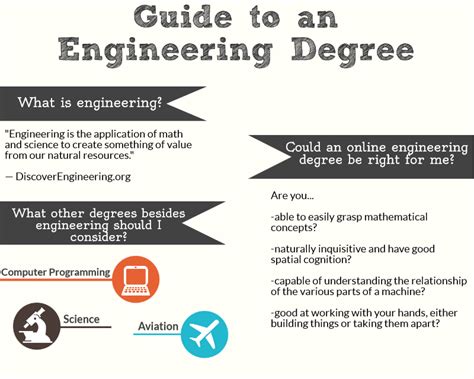Introduction
Pursuing an engineering degree is a significant undertaking that requires significant time, effort, and dedication. The duration of an engineering degree program can vary depending on factors such as the type of engineering discipline, the institution, and the student’s pace of study. This article delves into the nuances of engineering degree timelines, exploring the typical timeframes and discussing strategies for optimizing the experience.

Typical Duration
According to the National Center for Education Statistics (NCES), the median time to complete a bachelor’s degree in engineering is 4.3 years for full-time students. However, this duration can vary across different engineering disciplines, as some may require additional coursework or specialized training. For example, engineering programs with a focus on chemical engineering or biomedical engineering tend to be longer than those in mechanical or electrical engineering.
Accelerated Programs
Some institutions offer accelerated engineering programs that allow students to complete their degrees in a shorter timeframe, typically around 3.5 to 4 years. These programs often involve a more rigorous academic schedule and may require students to take summer courses or overload their semesters. Accelerated programs can be beneficial for students who are highly motivated and have a strong academic foundation.
Part-Time Study
For individuals who have work or other commitments that prevent them from attending school full-time, part-time study is a viable option. Part-time engineering programs typically take longer to complete, with a duration of 5 to 6 years or even longer. However, this flexible approach allows students to balance their academic pursuits with other responsibilities.
Master’s and Doctoral Degrees
Master’s degrees in engineering typically require 1.5 to 2 years of full-time study beyond the bachelor’s degree. Doctoral degrees, such as Ph.D.s, usually take 4 to 6 years of full-time study after the master’s degree. These advanced degrees provide specialized knowledge and research skills, preparing graduates for careers in academia, research, or industry leadership.
Effective Strategies
Optimizing the duration of an engineering degree requires a combination of effective strategies and personal motivation. Here are some proven approaches:
- Plan Ahead: Create a detailed academic plan that outlines the courses you need to take and the timeline for completion. This will help you stay on track and avoid unnecessary delays.
- Take Advantage of Resources: Utilize academic support services, such as tutoring, advising, and peer study groups. These resources can assist you in understanding complex concepts and staying current with the material.
- Manage Time Effectively: Develop a disciplined study schedule that allows ample time for coursework, assignments, and project work. Prioritize tasks and allocate time accordingly to prevent procrastination.
- Seek Internships: Internships provide practical experience and industry knowledge that can enhance your understanding of engineering principles and prepare you for the job market.
- Network with Professionals: Attend industry events, connect with alumni, and build relationships with engineers in the field. This will provide insights into the industry and potential career paths.
Conclusion
The duration of an engineering degree is a multifaceted consideration that depends on several factors. By understanding the typical timelines, exploring accelerated programs, and implementing effective strategies, individuals can optimize their academic experience and achieve their engineering aspirations within a reasonable timeframe. Embracing the challenges of engineering education with determination and a commitment to continuous learning will ultimately pave the way for a rewarding and fulfilling career.
Additional Considerations
Why Earning an Engineering Degree Matters:
- High Earning Potential: Engineers are among the highest-paid professionals in the United States, with a median annual salary of $100,640 in 2021 according to the Bureau of Labor Statistics.
- Job Security: Engineering is a growing field with a high demand for skilled professionals. Engineers play a vital role in developing and maintaining the infrastructure and technological advancements that shape our modern world.
- Career Flexibility: Engineering degrees provide a versatile foundation for careers in a wide range of industries, including aerospace, automotive, energy, healthcare, and manufacturing.
Benefits of Earning an Engineering Degree:
- Analytical and Problem-Solving Skills: Engineering programs cultivate strong analytical and problem-solving abilities, which are highly valued in various fields.
- Technical Expertise: Graduates acquire specialized knowledge and technical skills in their chosen engineering discipline, enabling them to contribute effectively to innovative solutions.
- Leadership and Communication Skills: Engineering education emphasizes teamwork, communication, and leadership skills, preparing graduates to thrive in collaborative environments.
Useful Tables
Table 1: Median Time to Complete Engineering Degrees (NCES, 2021)
| Degree | Full-Time Median Time (Years) |
|---|---|
| Bachelor’s Degree | 4.3 |
| Master’s Degree | 1.7 |
| Doctoral Degree | 5.3 |
Table 2: Sample Course Timeline for a Mechanical Engineering Degree
| Semester | Coursework |
|---|---|
| 1 | Calculus I, Physics I, Engineering Drawing |
| 2 | Calculus II, Physics II, Statics |
| 3 | Dynamics, Thermodynamics, Fluid Mechanics I |
| 4 | Heat Transfer, Machine Design I, Materials Science |
| 5 | Solid Mechanics, Electromechanics, Numerical Methods |
| 6 | Machine Design II, Control Systems, Capstone Project |
| 7 | Elective Courses, Independent Study, Senior Design Project |
| 8 | Senior Design Project Completion, Graduation |
Table 3: Accelerated Engineering Programs
| Institution | Program | Duration |
|---|---|---|
| Massachusetts Institute of Technology | Engineering Scholars Program | 3.5 years |
| University of California, Berkeley | Engineering Undecided Program | 3.75 years |
| University of Texas at Austin | Engineering Honors Program | 3.5 – 4 years |
Table 4: Strategies for Optimizing Engineering Degree Duration
| Strategy | Description |
|---|---|
| Plan Ahead | Create a detailed academic plan to stay on track. |
| Take Advantage of Resources | Utilize academic support services, tutoring, and peer study groups. |
| Manage Time Effectively | Develop a disciplined study schedule and prioritize tasks. |
| Seek Internships | Gain practical experience and enhance understanding through internships. |
| Network with Professionals | Build relationships with engineers in the field to gain insights and potential career opportunities. |
